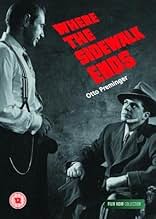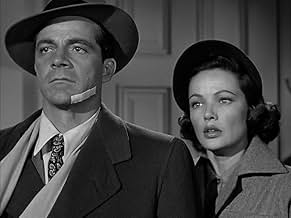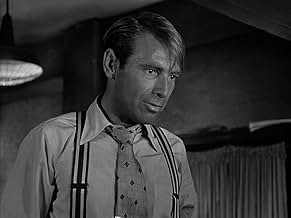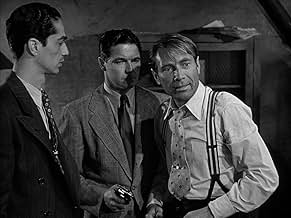CALIFICACIÓN DE IMDb
7.5/10
11 k
TU CALIFICACIÓN
El sargento Mark Dixon quiere ser algo que su padre no era: un tipo del lado correcto de la ley. ¿La naturaleza despiadada de Dixon se apoderará de él?El sargento Mark Dixon quiere ser algo que su padre no era: un tipo del lado correcto de la ley. ¿La naturaleza despiadada de Dixon se apoderará de él?El sargento Mark Dixon quiere ser algo que su padre no era: un tipo del lado correcto de la ley. ¿La naturaleza despiadada de Dixon se apoderará de él?
- Dirección
- Guionistas
- Elenco
- Premios
- 1 premio ganado en total
Fred Aldrich
- Detective at Staff Meeting
- (sin créditos)
Don Appell
- Willie Bender
- (sin créditos)
David Bauer
- Sid Kramer
- (sin créditos)
Eddie Borden
- Pool Hall Patron
- (sin créditos)
Neville Brand
- Steve
- (sin créditos)
Barry Brooks
- Thug
- (sin créditos)
Ralph Brooks
- Railroad Baggage Clerk
- (sin créditos)
Oleg Cassini
- Oleg
- (sin créditos)
John Close
- Hanson
- (sin créditos)
Opiniones destacadas
An excellent opening title sequence starts this gritty Noir off in perfect step with what will follow. The son of a thief who was killed while attempting to shoot himself out of jail, Mark Dixon became a cop in an attempt to atone for the sins of the father, but cannot quite escape the fathers blood surging through his veins every time he strikes out at a hood, and it's his excessive use of force that gets him demoted with the threat of losing his job as detective, the only thing he ever wanted out of life. When he accidentally kills a witness to a murder, panic takes hold of him and he proceeds to cover up the evidence, but fate has a way of meting out cruel justice. Mark will fall in love for his victim's ex, and then her innocent uncle through another freak accident ends up taking the rap for the murder when the body turns up. And now the real moment of truth - atone for his own sins and free an innocent man, but probably lose the girl, or say nothing, keep the girl, but end up being just like his father? A brilliantly executed noir by Preminger and Dana Andrews nails one of the best performances of his career as the tormented detective.
If all "film noirs" were this good, we would have a lot more of them. If someone were to ask me what is one I would tell them to go see this movie as a perfect example. This a 50 year old movie that doesn't feel old. In other words, nothing sounds corny and stupid as others of the time. Dana Andrews had a real hard edge on his shoulder much different than in The Best Years Of Our Lives. Without giving anything away, I recommend seeing this movie "cold" like I did and be thoroughly entertained.
Despite the lack of a haunting theme song and the austere and humourous presence of Clifton Webb, this film is a much more exciting experience than "Laura", the other collaboration between Preminger, Andrews and Tierney. This is one of the grimmest film noir films I've ever seen, and not just in its lurid shadows and rain-drenched streets. The film is dark to its very soul. Dana Andrews plays what is now a standard stereotype: the cop who is bitter and deadly with his temper. But Andrews plays it with more honesty and humanity than most any other angry movie cop you're likely to see. Despite the fact that his character is good at heart, he is also a criminal and a killer, and the film beautifully strings him along, forcing him to serve his spiritual penance. What of course is most fun is the way that his terror over being discovered slowly comes to a boil. I've seen tons of film noir movies but I can't recall ever seeing the protagonist ever becoming the anti-hero in such a startling way. Many of the best film noir pics have that dizzying spiral theme of a man trapped by his own weakness. "Night in the City", "Detour", "Scarlet Street", "In a Lonely Place", "Act of Violence" and "Johnny Eager", are among the best of them. "Were the Sidewalk Ends" holds its own among them. Not a bad recommendation!
Elegance and class are not always the first words that come to mind when folks (at least folks who might do such a thing) sit around and talk about film noir.
Yet some of the best films of the genre, "Out of the Past," "The Killers," "In A Lonely Place," "Night and the City," manage a level of sleek sophistication that elevates them beyond a moody catch phrase and its connotations of foreboding shadows, fedoras, and femme-fatales.
"Where the Sidewalk Ends," a fairly difficult to find film -- the only copy in perhaps the best stocked video store in Manhattan was a rough bootleg from the AMC cable channel -- belongs in a category with these classics.
From the moment the black cloud of opening credits pass, a curtain is drawing around rogue loner detective Marc Dixon's crumbling world, and as the moments pass, it inches ever closer, threatening suffocation.
Sure, he's that familiar "cop with a dark past", but Dana Andrews gives Dixon a bleak stare and troubled intensity that makes you as uncomfortable as he seems. And yeah, he's been smacking around suspects for too long, and the newly promoted chief (Karl Malden, in a typically robust and commanding outing) is warning him "for the last time."
Yet Dixon hates these thugs too much to stop now. And boy didn't they had have it coming?
"Hoods, dusters, mugs, gutter nickel-rats" he spits when that tough nut of a boss demotes him and rolls out all of the complaints the bureau has been receiving about Dixon's right hook. The advice is for him to cool off for his own good. But instead he takes matters into his own hands.
And what a world of trouble he finds when he relies on his instincts, and falls back on a nature that may or may not have been passed down from a generation before.
Right away he's in deep with the cops, the syndicate, his own partner. Dixon's questionable involvement in a murder "investigation" threatens his job, makes him wonder whether he is simply as base as those he has sworn to bring in. Like Bogart in "Lonely Place," can he "escape what he is?"
When he has nowhere else to turn, he discovers that he has virtually doomed his unexpected relationship with a seraphic beauty (the marvelous Gene Tierney) who seems as if she can turn his barren bachelor's existence into something worth coming home to.
The pacing of this superb film is taut and gripping. The group of writers that contributed to the production polished the script to a high gloss -- the dialogue is snappy without disintegrating into dated parody fodder, passionate without becoming melodramatic or sappy.
And all of this top-notch direction and acting isn't too slick or buffed to loosen the film's emotional hold. Gene Tierney's angelic, soft-focus beauty is used to great effect. She shows herself to be an actress of considerable range, and her gentle, kind nature is as boundless here as is her psychosis in "Leave Her to Heaven." The scenes between Tierney and Andrews's Dixon grow more intense and touching the closer he seems to self-destruction.
Near the end of his rope, cut, bruised, and exhausted Dixon summarizes his lot: "Innocent people can get into terrible jams, too,.." he says. "One false move and you're in over your head."
Perhaps what makes this film so totally compelling is the sense that things could go wildly wrong for almost anyone -- especially for someone who is trying so hard to do right -- with one slight shift in the wind, one wrong decision or punch, or, most frighteningly, due to factors you have no control over. Noir has always reflected the darkest fears, brought them to the surface. "Where the Sidewalk Ends" does so in a realistic fashion.
(One nit-pick of an aside: This otherwise sterling film has a glaringly poor dub of a blonde model that wouldn't seem out of place on Mystery Science Theater. How very odd.)
But Noir fans -- heck, ANY movie fans -- who haven't seen this one are in for a terrific treat.
Yet some of the best films of the genre, "Out of the Past," "The Killers," "In A Lonely Place," "Night and the City," manage a level of sleek sophistication that elevates them beyond a moody catch phrase and its connotations of foreboding shadows, fedoras, and femme-fatales.
"Where the Sidewalk Ends," a fairly difficult to find film -- the only copy in perhaps the best stocked video store in Manhattan was a rough bootleg from the AMC cable channel -- belongs in a category with these classics.
From the moment the black cloud of opening credits pass, a curtain is drawing around rogue loner detective Marc Dixon's crumbling world, and as the moments pass, it inches ever closer, threatening suffocation.
Sure, he's that familiar "cop with a dark past", but Dana Andrews gives Dixon a bleak stare and troubled intensity that makes you as uncomfortable as he seems. And yeah, he's been smacking around suspects for too long, and the newly promoted chief (Karl Malden, in a typically robust and commanding outing) is warning him "for the last time."
Yet Dixon hates these thugs too much to stop now. And boy didn't they had have it coming?
"Hoods, dusters, mugs, gutter nickel-rats" he spits when that tough nut of a boss demotes him and rolls out all of the complaints the bureau has been receiving about Dixon's right hook. The advice is for him to cool off for his own good. But instead he takes matters into his own hands.
And what a world of trouble he finds when he relies on his instincts, and falls back on a nature that may or may not have been passed down from a generation before.
Right away he's in deep with the cops, the syndicate, his own partner. Dixon's questionable involvement in a murder "investigation" threatens his job, makes him wonder whether he is simply as base as those he has sworn to bring in. Like Bogart in "Lonely Place," can he "escape what he is?"
When he has nowhere else to turn, he discovers that he has virtually doomed his unexpected relationship with a seraphic beauty (the marvelous Gene Tierney) who seems as if she can turn his barren bachelor's existence into something worth coming home to.
The pacing of this superb film is taut and gripping. The group of writers that contributed to the production polished the script to a high gloss -- the dialogue is snappy without disintegrating into dated parody fodder, passionate without becoming melodramatic or sappy.
And all of this top-notch direction and acting isn't too slick or buffed to loosen the film's emotional hold. Gene Tierney's angelic, soft-focus beauty is used to great effect. She shows herself to be an actress of considerable range, and her gentle, kind nature is as boundless here as is her psychosis in "Leave Her to Heaven." The scenes between Tierney and Andrews's Dixon grow more intense and touching the closer he seems to self-destruction.
Near the end of his rope, cut, bruised, and exhausted Dixon summarizes his lot: "Innocent people can get into terrible jams, too,.." he says. "One false move and you're in over your head."
Perhaps what makes this film so totally compelling is the sense that things could go wildly wrong for almost anyone -- especially for someone who is trying so hard to do right -- with one slight shift in the wind, one wrong decision or punch, or, most frighteningly, due to factors you have no control over. Noir has always reflected the darkest fears, brought them to the surface. "Where the Sidewalk Ends" does so in a realistic fashion.
(One nit-pick of an aside: This otherwise sterling film has a glaringly poor dub of a blonde model that wouldn't seem out of place on Mystery Science Theater. How very odd.)
But Noir fans -- heck, ANY movie fans -- who haven't seen this one are in for a terrific treat.
Produced and directed by Otto Preminger, and starring Dana Andrews, the king of the B-movies, this is a terrific 20th-Century Fox film noir, all heavy woollen topcoats, stylish wide-brimmed hats and skewed camera angles. It's a film with a superb 'dark' look and a Ben Hecht script which delivers the authentic cadences of noirspeak.
Mark Dixon is a tough cop. His father was a small-time hood, and Dixon feels he has something to prove. He uses street methods, roughing-up bad guys and bullying stoolpigeons. He is not liked by his superiors, and has remained a detective sergeant, whereas his contemporary Lewis (Karl Malden) has played it by the book and has risen to the rank of lieutenant. Lewis is now Dixon's boss, and there is considerable tension between the two men.
Enter Ken Paine (Craig Stevens), a two-bit crook and bagman for Scalise (Guy Merrill). Tall, dark and handsome, and a much-decorated war hero, Paine is a drinker and a punk who lurks around cheap crap games. He is dating a dame by the name of Morgan Taylor (Gene Tierney), a looker with a whiff of glamour about her. Morgan is a fashion model in a Manhattan department store by day, and an 'escort' in Scalise's gambling club by night. Jiggs Taylor, her father (Tom Tulley), is a New York cabbie with a fondness for telling tall stories.
Dixon is on his last chance. The captain has made it clear - no more rough stuff. Then something dreadful happens, and Dixon panics and tries to cover it up. He sets in motion a train of events which he can't control, especially after he becomes emotionally involved with the beautiful Morgan. Dixon's tormented soul is the film's battleground, the instinct for self-preservation warring with a guilty conscience and a need to earn the girl's respect.
Though they do not spoil the movie, there are some things in the story which don't quite add up. A detective openly discusses a current investigation with a yellow cab driver, something which even the unorthodox Dixon would never do. Dishes are served to Dixon and Morgan in the restaurant, even though they didn't order anything specific. How is Morgan able to get to Paine's apartment in the couple of minutes which elapse after she hears the news? Why do the police interrogate Jiggs at the scene, in the presence of his daughter? Surely the detectives know better than to subject Jiggs to a confrontation ID without allowing him access to legal advice?
A 'noir' is nothing if not atmospheric, and this one is dripping with atmosphere. Brooklyn Bridge looms high over the mean streets, a skeletal silhouette which haunts the action like some urban angel of doom. New York City is the matrix in and through which these characters function, the context of their entire existence, and its presence is constantly felt. Whether by means of an el-train overhead, or a forest of skyscrapers swimming into focus through the locker-room window, the city surrounds and bears in upon these people, the malevolent nest through which they are obliged to scurry.
Dana Andrews is excellent as Dixon, the tough guy who retains our sympathy because he is capable of remorse. Watch out for Scalise's masseur, a very young Neville Brand.
It doesn't always help to be innocent, says Dixon, the hard man conscious of the harsh ways of the city, but the wretchedness of a guilty conscience is a terrible burden to bear. The camera conveys this beautifully, with a brooding Dixon large in the foreground as the investigation proceeds, and earlier, his horrified face twisted by a fish-eye lens as he realises the enormity of what he has done.
Verdict - A murky, grim film noir ... marvellous!
Mark Dixon is a tough cop. His father was a small-time hood, and Dixon feels he has something to prove. He uses street methods, roughing-up bad guys and bullying stoolpigeons. He is not liked by his superiors, and has remained a detective sergeant, whereas his contemporary Lewis (Karl Malden) has played it by the book and has risen to the rank of lieutenant. Lewis is now Dixon's boss, and there is considerable tension between the two men.
Enter Ken Paine (Craig Stevens), a two-bit crook and bagman for Scalise (Guy Merrill). Tall, dark and handsome, and a much-decorated war hero, Paine is a drinker and a punk who lurks around cheap crap games. He is dating a dame by the name of Morgan Taylor (Gene Tierney), a looker with a whiff of glamour about her. Morgan is a fashion model in a Manhattan department store by day, and an 'escort' in Scalise's gambling club by night. Jiggs Taylor, her father (Tom Tulley), is a New York cabbie with a fondness for telling tall stories.
Dixon is on his last chance. The captain has made it clear - no more rough stuff. Then something dreadful happens, and Dixon panics and tries to cover it up. He sets in motion a train of events which he can't control, especially after he becomes emotionally involved with the beautiful Morgan. Dixon's tormented soul is the film's battleground, the instinct for self-preservation warring with a guilty conscience and a need to earn the girl's respect.
Though they do not spoil the movie, there are some things in the story which don't quite add up. A detective openly discusses a current investigation with a yellow cab driver, something which even the unorthodox Dixon would never do. Dishes are served to Dixon and Morgan in the restaurant, even though they didn't order anything specific. How is Morgan able to get to Paine's apartment in the couple of minutes which elapse after she hears the news? Why do the police interrogate Jiggs at the scene, in the presence of his daughter? Surely the detectives know better than to subject Jiggs to a confrontation ID without allowing him access to legal advice?
A 'noir' is nothing if not atmospheric, and this one is dripping with atmosphere. Brooklyn Bridge looms high over the mean streets, a skeletal silhouette which haunts the action like some urban angel of doom. New York City is the matrix in and through which these characters function, the context of their entire existence, and its presence is constantly felt. Whether by means of an el-train overhead, or a forest of skyscrapers swimming into focus through the locker-room window, the city surrounds and bears in upon these people, the malevolent nest through which they are obliged to scurry.
Dana Andrews is excellent as Dixon, the tough guy who retains our sympathy because he is capable of remorse. Watch out for Scalise's masseur, a very young Neville Brand.
It doesn't always help to be innocent, says Dixon, the hard man conscious of the harsh ways of the city, but the wretchedness of a guilty conscience is a terrible burden to bear. The camera conveys this beautifully, with a brooding Dixon large in the foreground as the investigation proceeds, and earlier, his horrified face twisted by a fish-eye lens as he realises the enormity of what he has done.
Verdict - A murky, grim film noir ... marvellous!
¿Sabías que…?
- TriviaThe only feature film appearance for fashion and costume designer Oleg Cassini, who was married to Gene Tierney at the time. They would divorce in 1952. Reportedly, Cassini talked director Otto Preminger into giving him the part.
- ErroresWhen Dixon is staging the murder scene after Ken Paine' death, he is gloveless. A few seconds later he has gloves on both hands.
- Citas
[to Detective Dixon]
Insp. Nicholas Foley: Your job is to detect criminals, not to punish them.
- Créditos curiososThe opening credits start as chalk writing on a sidewalk with someone walking over them and whistling.
- ConexionesFeatured in Gene Tierney: Final Curtain for a Noir Icon (2008)
Selecciones populares
Inicia sesión para calificar y agrega a la lista de videos para obtener recomendaciones personalizadas
- How long is Where the Sidewalk Ends?Con tecnología de Alexa
Detalles
- Fecha de lanzamiento
- País de origen
- Idioma
- También se conoce como
- Where the Sidewalk Ends
- Locaciones de filmación
- 58 Pike Street, Manhattan, Nueva York, Nueva York, Estados Unidos(Ken Paine's apartment - between Madison and Monroe Streets - since demolished. Note Manhattan Bridge in the background)
- Productora
- Ver más créditos de la compañía en IMDbPro
Taquilla
- Presupuesto
- USD 1,475,000 (estimado)
- Tiempo de ejecución
- 1h 35min(95 min)
- Color
- Relación de aspecto
- 1.37 : 1
Contribuir a esta página
Sugiere una edición o agrega el contenido que falta



































